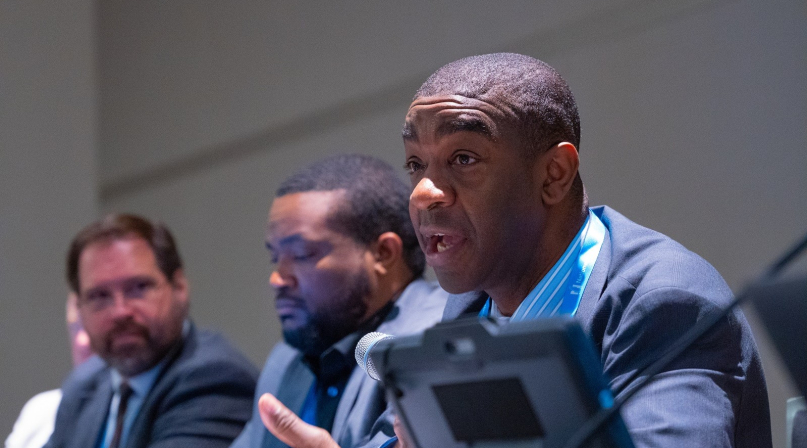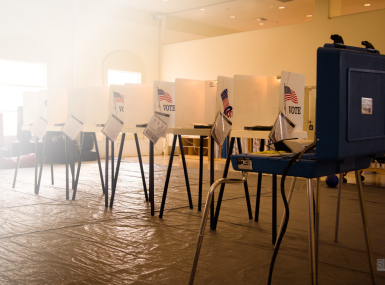Poll workers remain a must-have for election officials

Key Takeaways
Despite all of his worries about the pandemic and the vulnerable age of many of his poll workers in Williamson County, Texas, Election Administrator Chris Davis made it through 2020 successfully in a state where limited vote-by-mail options put pressure on in-person voting.
The aftermath, however, has been different.
“We were bracing at the onset of the pandemic for a real dent in our poll worker pool, but our poll workers were really responding to the duty as long as we could assure them that they’d be protected,” from the coronavirus, Davis said.
Understanding Lessons Learned and Trends in Elections
July 23, 2023
NACo Annual Conference - Travis County, Texas
“Then doubt in the way that our voting processes are carried out and the systems that our poll workers are very particularly trained on became pervasive in the media and at the dinner table, at the legislature,” he said.
“That had as much, if not more, of a profound impact in our goals for our poll workers to come back and work for us,” he noted. “Much, much more than any threat of a pandemic.”
Recruiting and retaining poll workers is a challenge for most counties, and San Benito County, Calif. Supervisor Angela Curro said seniors are the key to making their operations, where she was once assistant clerk-recorder-registrar of voters.
“We took seniors who are retired and added some seniors in high school,” she said. “I can’t tell you how well that worked. I recruited my son and he recruited some of his friends and the retirees loved them. That combination of historic knowledge from our seniors with our youth was the most powerful thing we ever did in recruitment.”
The various election officials agreed that paying poll workers was crucial, and U.S. Election Assistance Commission member Thomas Hicks said federal grant money can be used to pay poll workers for federal elections.
Durham County, N.C. pays poll workers $16 an hour.
“It really pulls folks in,” said Derek Bowens, the county’s elections director. “Of course, that’s secondary to their desire to be socially responsible, but it is a really big part of it we find, that that drives a lot of our participation.”
Bowens also credited the North Carolina Secretary of State’s Democracy Heroes program, which debuted in 2020. Prospective poll workers indicate their interest via an online survey, which routes their contact information to their respective county elections office.
“For our county, it was substantial in 2020 especially, because we needed over 1,000 workers to staff 17 days of early voting at 57 polling locations throughout the county,” he said.
But in Weber County, Utah, Clerk/Auditor Ricky Hatch has it comparably made in the shade. Utah's hybrid mail/in-person voting system has revolutionized poll worker needs, because less than 5% of voters show up at voting centers.
“In 2012, for 125,000 registered voters, we had 63 polling places and had to hire about 650 poll workers,” he said. “In 2022, we had two polling centers and hired about 100 poll workers. We don’t need as many; we really can pick the cream of the crop.”
Hatch and Bowens stressed the importance of screening applicants. Bowens and his staff conduct video interviews. Hatch’s staff vet applicants’ social media accounts.
“Not for any political affiliation, but we really look for extremism or an unwillingness to consider opposing points of view,” he said. “That’s something that we’re really careful about.”
Attachments
Related News

County Countdown – April 7, 2025
Every other week, NACo's County Countdown reviews top federal policy advocacy items with an eye towards counties and the intergovernmental partnership. This week features a budget reconciliation update, HHS restructuring and more.

Both the Administration and Congress act on 'noncitizen voting:' What this could mean for counties
The U.S. House will consider the Safeguard American Voter Eligibility (SAVE) Act this week to require individuals to provide proof of citizenship to register to vote.

Multi-State Information Sharing and Analysis Center (MS-ISAC) loses federal funding
On March 11, the Cybersecurity and Infrastructure Security Agency (CISA) announced a $10 million cut in funding for the Multi-State Information Sharing and Analysis Center (MS-ISAC), which provides critical local assistance for cybersecurity threat detection and analysis resources and support.
